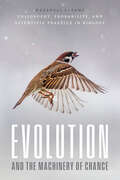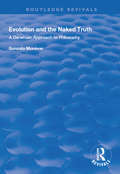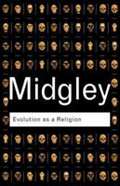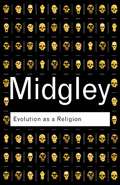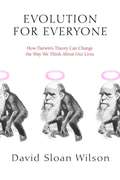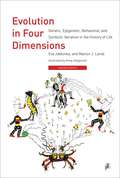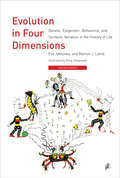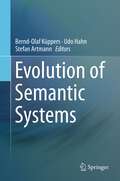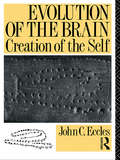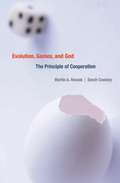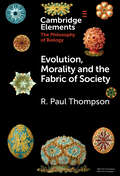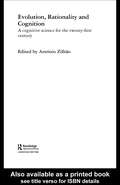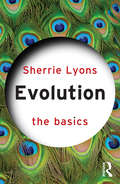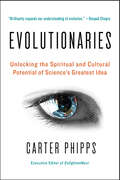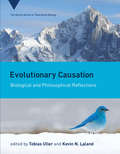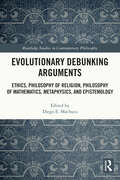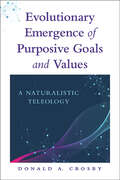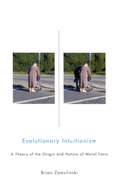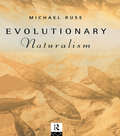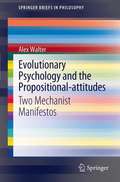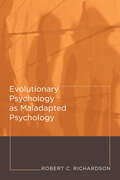- Table View
- List View
Evolution and the Machinery of Chance: Philosophy, Probability, and Scientific Practice in Biology
by Marshall AbramsAn innovative view of the role of fitness concepts in evolutionary theory. Natural selection is one of the factors responsible for changes in biological populations. Some traits or organisms are fitter than others, and natural selection occurs when there are changes in the distribution of traits in populations because of fitness differences. Many philosophers of biology insist that a trait’s fitness should be defined as an average of the fitnesses of individual members of the population that have the trait. Marshall Abrams argues convincingly against this widespread approach. As he shows, it conflicts with the roles that fitness is supposed to play in evolutionary theory and with the ways that evolutionary biologists use fitness concepts in empirical research. The assumption that a causal kind of fitness is fundamentally a property of actual individuals has resulted in unnecessary philosophical puzzles and years of debate. Abrams came to see that the fitnesses of traits that are the basis of natural selection cannot be defined in terms of the fitnesses of actual members of populations, as philosophers of biology often claim. Rather, it is an overall population-environment system—not actual, particular organisms living in particular environmental conditions—that is the basis of trait fitnesses. Abrams argues that by distinguishing different classes of fitness concepts and the roles they play in the practice of evolutionary biology, we can see that evolutionary biologists’ diverse uses of fitness concepts make sense together and are consistent with the idea that fitness differences cause evolution. Abrams’s insight has broad significance, for it provides a general framework for thinking about the metaphysics of biological evolution and its relations to empirical research. As such, it is a game-changing book for philosophers of biology, biologists who want deeper insight into the nature of evolution, and anyone interested in the applied philosophy of probability.
Evolution and the Naked Truth: Darwinian Approach to Philosophy (Routledge Revivals)
by Gonzalo MunevarPublished in 1998, the main aim of this book is to use a naturalistic, evolutionary approach to solve some of the most important problems in philosophy. The first two problems come from the philosophy of science: the problem of rationality of science and the problem of truth in science. In presenting the first problem, the author argues that the views of Kuhn and Feyerabend do create a very serious challenge to traditional epistemology, however, if the assumption of individual rationality is abandoned in favour of the author's social concept of rationality, a committed naturalism can account for science as a rational activity. In tackling the second problem of truth, the author shows that a committed evolutionary philosophy does not support realism but leads instead to a thorough evolutionary relativism of scientific knowledge. It is nevertheless possible to use this evolutionary relativism to construct a theory of relative truth. The issue of whether science discovers truth has also been tied to absolutism, that a well formulated theory of relative truth is likely to bring about a profound transformation of the way we think about the field. The author explores the notion of relative truth in the philosophy of science, ethics and aesthetics.
Evolution as a Religion: Strange Hopes and Stranger Fears
by Mary MidgleyThis book examines how science comes to be used as a substitute for religion and points out how badly that role distorts it. Her argument is flawlessly insightful: a punch, compelling, lively indictment of these misuses of science. Both the book and its author are true classics of our time.
Evolution as a Religion: Strange Hopes and Stranger Fears (Routledge Classics)
by Mary MidgleyAccording to a profile in The Guardian, Mary Midgley is 'the foremost scourge of scientific pretensions in this country; someone whose wit is admired even by those who feel she sometimes oversteps the mark'. Considered one of Britain's finest philosophers, Midgley exposes the illogical logic of poor doctrines that shelter themselves behind the prestige of science. Always at home when taking on the high priests of evolutionary theory - Dawkins, Wilson and their acolytes - she has famously described evolution as 'the creation-myth of our age'. In Evolution as a Religion, she examines how science comes to be used as a substitute for religion and points out how badly that role distorts it. As ever, her argument is flawlessly insightful: a punchy, compelling, lively indictment of these misuses of science. Both the book and its author are true classics of our time.
Evolution for Everyone: How Darwin's Theory Can Change the Way We Think About Our Lives
by David Sloan WilsonWhat is the biological reason for gossip? For laughter? For the creation of art? Why do dogs have curly tails? What can microbes tell us about morality? These and many other questions are tackled by renowned evolutionist David Sloan Wilson in this witty and groundbreaking new book. With stories that entertain as much as they inform, Wilson outlines the basic principles of evolution and shows how, properly understood, they can illuminate the length and breadth of creation, from the origin of life to the...
Evolution in Four Dimensions
by Eva Jablonka Anna Zeligowski Marion J. LambThis new edition of the widely read Evolution in Four Dimensions has been revised to reflect the spate of new discoveries in biology since the book was first published in 2005, offering corrections, an updated bibliography, and a substantial new chapter. Eva Jablonka and Marion Lamb's pioneering argument proposes that there is more to heredity than genes. They describe four "dimensions" in heredity -- four inheritance systems that play a role in evolution: genetic, epigenetic (or non-DNA cellular transmission of traits), behavioral, and symbolic (transmission through language and other forms of symbolic communication). These systems, they argue, can all provide variations on which natural selection can act. Jablonka and Lamb present a richer, more complex view of evolution than that offered by the gene-based Modern Synthesis, arguing that induced and acquired changes also play a role. Their lucid and accessible text is accompanied by artist-physician Anna Zeligowski's lively drawings, which humorously and effectively illustrate the authors' points. Each chapter ends with a dialogue in which the authors refine their arguments against the vigorous skepticism of the fictional "I.M." (for Ipcha Mistabra -- Aramaic for "the opposite conjecture"). The extensive new chapter, presented engagingly as a dialogue with I.M., updates the information on each of the four dimensions -- with special attention to the epigenetic, where there has been an explosion of new research. Praise for the first edition"With courage and verve, and in a style accessible to general readers, Jablonka and Lamb lay out some of the exciting new pathways of Darwinian evolution that have been uncovered by contemporary research." -- Evelyn Fox Keller, MIT, author of Making Sense of Life: Explaining Biological Development with Models, Metaphors, and Machines"In their beautifully written and impressively argued new book, Jablonka and Lamb show that the evidence from more than fifty years of molecular, behavioral and linguistic studies forces us to reevaluate our inherited understanding of evolution." -- Oren Harman, The New Republic"It is not only an enjoyable read, replete with ideas and facts of interest but it does the most valuable thing a book can do -- it makes you think and reexamine your premises and long-held conclusions." -- Adam Wilkins, BioEssays
Evolution in Four Dimensions, revised edition: Genetic, Epigenetic, Behavioral, and Symbolic Variation in the History of Life (Life and Mind: Philosophical Issues in Biology and Psychology)
by Eva Jablonka Marion J. LambA pioneering proposal for a pluralistic extension of evolutionary theory, now updated to reflect the most recent research. This new edition of the widely read Evolution in Four Dimensions has been revised to reflect the spate of new discoveries in biology since the book was first published in 2005, offering corrections, an updated bibliography, and a substantial new chapter. Eva Jablonka and Marion Lamb's pioneering argument proposes that there is more to heredity than genes. They describe four “dimensions” in heredity—four inheritance systems that play a role in evolution: genetic, epigenetic (or non-DNA cellular transmission of traits), behavioral, and symbolic (transmission through language and other forms of symbolic communication). These systems, they argue, can all provide variations on which natural selection can act. Jablonka and Lamb present a richer, more complex view of evolution than that offered by the gene-based Modern Synthesis, arguing that induced and acquired changes also play a role. Their lucid and accessible text is accompanied by artist-physician Anna Zeligowski's lively drawings, which humorously and effectively illustrate the authors' points. Each chapter ends with a dialogue in which the authors refine their arguments against the vigorous skepticism of the fictional “I.M.” (for Ipcha Mistabra—Aramaic for “the opposite conjecture”). The extensive new chapter, presented engagingly as a dialogue with I.M., updates the information on each of the four dimensions—with special attention to the epigenetic, where there has been an explosion of new research. Praise for the first edition“With courage and verve, and in a style accessible to general readers, Jablonka and Lamb lay out some of the exciting new pathways of Darwinian evolution that have been uncovered by contemporary research.”—Evelyn Fox Keller, MIT, author of Making Sense of Life: Explaining Biological Development with Models, Metaphors, and Machines“In their beautifully written and impressively argued new book, Jablonka and Lamb show that the evidence from more than fifty years of molecular, behavioral and linguistic studies forces us to reevaluate our inherited understanding of evolution.”—Oren Harman, The New Republic“It is not only an enjoyable read, replete with ideas and facts of interest but it does the most valuable thing a book can do—it makes you think and reexamine your premises and long-held conclusions.”—Adam Wilkins, BioEssays
Evolution of Semantic Systems
by Bernd-Olaf Küppers Stefan Artmann Udo HahnComplex systems in nature and society make use of information for the development of their internal organization and the control of their functional mechanisms. Alongside technical aspects of storing, transmitting and processing information, the various semantic aspects of information, such as meaning, sense, reference and function, play a decisive part in the analysis of such systems. With the aim of fostering a better understanding of semantic systems from an evolutionary and multidisciplinary perspective, this volume collects contributions by philosophers and natural scientists, linguists, information and computer scientists. They do not follow a single research paradigm; rather they shed, in a complementary way, new light upon some of the most important aspects of the evolution of semantic systems. Evolution of Semantic Systems is intended for researchers in philosophy, computer science, and the natural sciences who work on the analysis or development of semantic systems, ontologies, or similar complex information structures. In the eleven chapters, they will find a broad discussion of topics ranging from underlying universal principles to representation and processing aspects to paradigmatic examples.
Evolution of the Brain: Creation Of The Self
by John C. EcclesSir John Eccles, a distinguished scientist and Nobel Prize winner who has devoted his scientific life to the study of the mammalian brain, tells the story of how we came to be, not only as animals at the end of the hominid evolutionary line, but also as human persons possessed of reflective consciousness.
Evolution of the Social Contract
by Brian SkyrmsIn this pithy and highly readable book, Brian Skyrms, a recognised authority on game and decision theory, investigates traditional problems of the social contract in terms of evolutionary dynamics. Game theory is skilfully employed to offer new interpretations of a wide variety of social phenomena, including justice, mutual aid, commitment, convention and meaning. The author eschews any grand, unified theory. Rather, he presents the reader with tools drawn from evolutionary game theory for the purpose of analysing and coming to understand the social contract. The book is not technical and requires no special background knowledge. As such, it could be enjoyed by students and professionals in a wide range of disciplines: political science, philosophy, decision theory, economics and biology.
Evolution, Games, and God
by Sarah Coakley Martin A. NowakEvolution, Games, and God explores how cooperation and altruism, alongside mutation and natural selection, play a critical role in evolution, from microbes to human societies. Inheriting a tendency to cooperate and self-sacrifice on behalf of others may be as beneficial to a population’s survival as the self-preserving instincts of individuals.
Evolution, Morality and the Fabric of Society (Elements in the Philosophy of Biology)
by R. Paul ThompsonRecent interest in the evolution of the social contract is extended by providing a throughly naturalistic, evolutionary account of the biological underpinnings of a social contract theory of morality. This social contract theory of morality (contractevolism) provides an evolutionary justification of the primacy of a moral principle of maximisation of the opportunities for evolutionary reproductive success (ERS), where maximising opportunities does not entail an obligation on individuals to choose to maximise their ERS. From that primary principle, the moral principles of inclusion, individual sovereignty (liberty) and equality can be derived. The implications of these principles, within contractevolism, are explored through an examination of patriarchy, individual sovereignty and copulatory choices, and overpopulation and extinction. Contractevolism is grounded in evolutionary dynamics that resulted in humans and human societies. The most important behavioural consequences of evolution to contractevolism are reciprocity, cooperation, empathy, and the most important cognitive consequences are reason and behavioural modification.
Evolution, Rationality and Cognition: A Cognitive Science for the Twenty-First Century (Routledge Studies in the Philosophy of Science)
by António ZilhãoEvolutionary thinking has expanded in the last decades, spreading from its traditional stronghold – the explanation of speciation and adaptation in biology - to new domains. Fascinating pieces of work, the essays in this collection attest to the illuminating power of evolutionary thinking when applied to the understanding of the human mind. The contributors to Cognition, Evolution and Rationality use an evolutionary standpoint to approach the nature of the human mind, including both cognitive and behavioural functions. Cognitive science is by its nature an interdisciplinary subject and the essays in this collection investigate the workings of the mind through a variety of disciplines including the philosophy of science, the philosophy of mind, game theory, robotics and computational neuroanatomy. Topics covered range from general methodological issues to long-standing philosophical problems such as how rational human beings actually are. With contributions from leading experts in the areas involved, this book will be of interest across a number of fields, including philosophy, evolutionary theory and cognitive science.
Evolution: The Basics (The Basics)
by Sherrie LyonsEvolution: The Basics is an engaging introduction to the history, development and science of the theory of evolution. Beginning pre-Darwin and concluding with the latest research and controversies, readers are introduced to the origins of the idea of evolution, the ways in which it has developed and been adapted over time and the science underpinning it all. Topics addressed include: • early theories of evolution• the impact of Darwin’s On the Origin of Species• the discovery of genetics and Mendel’s experiments • molecular evolution and the discovery of DNA • the expansion of life and the persistence of disease• revisiting evolutionary ethics and the development of empathy. Evolution: The Basics examines the role of evolution in current debates and discusses the possible future developments in the field. This book is invaluable reading for all students and individuals seeking to understand the wide ranging sphere of evolutionary theory.
Evolutionaries: Unlocking the Spiritual and Cultural Potential of Science's Greatest Idea
by Carter PhippsThis survey of science, religion and philosophy by an Integral thought leader “brilliantly expands our understanding of evolution” (Deepak Chopra).Blending cutting-edge ideas with spiritual insights, Evolutionaries is the first popular presentation of an emerging school of thought called “evolutionary spirituality.” Carter Phipps, the former executive editor of EnlightenNext magazine, asserts that evolution is not only a scientific but also a spiritual idea in a book whose message has the power to bring new meaning and purpose to life as we know it. Readers will be fascinated and enlightened by Evolutionaries, a book which Deepak Chopra says “is going to help create a worldview that will influence our vision of the future direction of evolution and also our role in consciously participating in it.”“A profound and profoundly important new work.” —Ken Wilber, author of A Brief History of Everything and The Integral Vision “No one has their head and heart around the full range of evolutionary worldviews like Carter Phipps.” —Reverend Michael Dowd, author of Thank God for Evolution “A significant contribution.” John F. Haught, Senior Fellow at Georgetown University's Woodstock Theological Center and Former Chair and Professor of the Department of Theology at Georgetown University“It would be hard to find a better guide into this fascinating conversation than Carter Phipps’s Evolutionaries.” —Brian Swimme, Ph.D, Director of the Center for the Story of the Universe and Professor at the California Institute of Integral Studies “Thoughtful and provocative.” —Kirkus Reviews“Phipps’s writing projects a palpable sense of positivity and excitement for what is to come.” —Publishers Weekly
Evolutionary Causation: Biological and Philosophical Reflections (Vienna Series in Theoretical Biology #23)
by Kevin N. Laland Tobias UllerA comprehensive treatment of the concept of causation in evolutionary biology that makes clear its central role in both historical and contemporary debates.Most scientific explanations are causal. This is certainly the case in evolutionary biology, which seeks to explain the diversity of life and the adaptive fit between organisms and their surroundings. The nature of causation in evolutionary biology, however, is contentious. How causation is understood shapes the structure of evolutionary theory, and historical and contemporary debates in evolutionary biology have revolved around the nature of causation. Despite its centrality, and differing views on the subject, the major conceptual issues regarding the nature of causation in evolutionary biology are rarely addressed. This volume fills the gap, bringing together biologists and philosophers to offer a comprehensive, interdisciplinary treatment of evolutionary causation.Contributors first address biological motivations for rethinking evolutionary causation, considering the ways in which development, extra-genetic inheritance, and niche construction challenge notions of cause and process in evolution, and describing how alternative representations of evolutionary causation can shed light on a range of evolutionary problems. Contributors then analyze evolutionary causation from a philosophical perspective, considering such topics as causal entanglement, the commingling of organism and environment, and the relationship between causation and information.ContributorsJohn A. Baker, Lynn Chiu, David I. Dayan, Renée A. Duckworth, Marcus W Feldman, Susan A. Foster, Melissa A. Graham, Heikki Helanterä, Kevin N. Laland, Armin P. Moczek, John Odling-Smee, Jun Otsuka, Massimo Pigliucci, Arnaud Pocheville, Arlin Stoltzfus, Karola Stotz, Sonia E. Sultan, Christoph Thies, Tobias Uller, Denis M. Walsh, Richard A. Watson
Evolutionary Debunking Arguments: Ethics, Philosophy of Religion, Philosophy of Mathematics, Metaphysics, and Epistemology (Routledge Studies in Contemporary Philosophy)
by Diego E. MachucaRecent years have seen an explosion of interest in evolutionary debunking arguments directed against certain types of belief, particularly moral and religious beliefs. According to those arguments, the evolutionary origins of the cognitive mechanisms that produce the targeted beliefs render these beliefs epistemically unjustified. The reason is that natural selection cares for reproduction and survival rather than truth, and false beliefs can in principle be as evolutionarily advantageous as true beliefs. The present volume brings together fourteen essays that examine evolutionary debunking arguments not only in ethics and philosophy of religion, but also in philosophy of mathematics, metaphysics, and epistemology. The essays move forward research on those arguments by shedding fresh light on old problems and proposing new lines of inquiry. The book will appeal to scholars and graduate students interested in the possible skeptical implications of evolutionary theory in any of the above domains.
Evolutionary Debunking Arguments: Ethics, Philosophy of Religion, Philosophy of Mathematics, Metaphysics, and Epistemology (Routledge Studies in Contemporary Philosophy)
by Diego E. MachucaRecent years have seen an explosion of interest in evolutionary debunking arguments directed against certain types of belief, particularly moral and religious beliefs. According to those arguments, the evolutionary origins of the cognitive mechanisms that produce the targeted beliefs render these beliefs epistemically unjustified. The reason is that natural selection cares for reproduction and survival rather than truth, and false beliefs can in principle be as evolutionarily advantageous as true beliefs. The present volume brings together fourteen essays that examine evolutionary debunking arguments not only in ethics and philosophy of religion, but also in philosophy of mathematics, metaphysics, and epistemology. The essays move forward research on those arguments by shedding fresh light on old problems and proposing new lines of inquiry. The book will appeal to scholars and graduate students interested in the possible skeptical implications of evolutionary theory in any of the above domains.
Evolutionary Emergence of Purposive Goals and Values: A Naturalistic Teleology
by Donald A. CrosbyWhere do the purposes, values, and existential meanings of the world come from? For many, they are conferred on the world and on humans within the world by a supernatural, transcendent, personal divine creator and sustainer. For others, they result from a God or divine presence residing within nature. For still others, they give evidence of mind and spirit as primordial principles suffusing nature from the outset and in all of its forms. In Evolutionary Emergence of Purposive Goals and Values, Donald A. Crosby takes issue with each of these views. His thesis is that mind, meaning, purpose, and value come into existence with the evolutionary emergence of life, and that evolution itself gives evidence of the creative power of two primordial natural principles: matter-energy and time. There is no overarching purpose, value, or meaning of nature as such, but there is a plethora of such factors evident in the evolved life forms of nature here on earth. This fact is especially evident in the day-to-day experiences, aspirations, and concerns of us evolutionarily-evolved human beings. Purpose, meaning, and value are therefore gifts of evolutionary nature, not of any supernatural or non-natural principle, presence, or power.
Evolutionary Intuitionism
by Brian ZamulinskiEvolutionary Intuitionism presents a new evolutionary theory of human morality. Zamulinski explains the evolution of foundational attitudes, whose relationships to acts constitute moral facts. With foundational attitudes and the resulting moral facts in place, he shows how they ground a plausible normative morality, give answers to meta-ethical questions, and provide an account of moral motivation. He explains the nature of moral intuitions and, thus, of our access to the moral facts. He shows that the theory makes confirmed empirical predictions, including the observable variation in moral views. The combination of intuitionism and evolutionary ethics enables Zamulinski to overcome the standard objections to both.
Evolutionary Intuitionism: A Theory of the Origin and Nature of Moral Facts
by Brian ZamulinskiEvolutionary Intuitionism presents a new evolutionary theory of human morality. Zamulinski explains the evolution of foundational attitudes, whose relationships to acts constitute moral facts. With foundational attitudes and the resulting moral facts in place, he shows how they ground a plausible normative morality, give answers to meta-ethical questions, and provide an account of moral motivation. He explains the nature of moral intuitions and, thus, of our access to the moral facts. He shows that the theory makes confirmed empirical predictions, including the observable variation in moral views. The combination of intuitionism and evolutionary ethics enables Zamulinski to overcome the standard objections to both.
Evolutionary Naturalism: Selected Essays
by Michael RuseFirst published in 1995. Routledge is an imprint of Taylor & Francis, an informa company.
Evolutionary Psychology and the Propositional-attitudes
by Alex WalterThe two essays provide a critical examination of theory and research in the field of evolutionary psychology. The view advanced here is that philosophical materialism and minimalist assumptions about adaptation serve Darwinian psychology better than the more popular alternative view that relies on cognitive dualism and propositional-attitude psychology to formulate evolutionary psychology theory. A commitment to cognitive dualism is destined to undermine the physical basis of behavior upon which evolutionary theory depends. Many evolutionary psychologists do not see this but are seduced by the easy way in which hypotheses can be formulated using the 'propositional-attitude' model. The challenge is to develop a materialistic and mechanistic approach to understanding human cognition and behavior, including linguistic and social behavior.
Evolutionary Psychology and the Propositional-attitudes: Two Mechanist Manifestos (SpringerBriefs in Philosophy)
by Alex WalterThe two essays provide a critical examination of theory and research in the field of evolutionary psychology. The view advanced here is that philosophical materialism and minimalist assumptions about adaptation serve Darwinian psychology better than the more popular alternative view that relies on cognitive dualism and propositional-attitude psychology to formulate evolutionary psychology theory. A commitment to cognitive dualism is destined to undermine the physical basis of behavior upon which evolutionary theory depends. Many evolutionary psychologists do not see this but are seduced by the easy way in which hypotheses can be formulated using the ‘propositional-attitude’ model. The challenge is to develop a materialistic and mechanistic approach to understanding human cognition and behavior, including linguistic and social behavior.
Evolutionary Psychology as Maladapted Psychology (Life and Mind: Philosophical Issues in Biology and Psychology)
by Robert C. RichardsonA philosopher subjects the claims of evolutionary psychology to the evidential and methodological requirements of evolutionary biology, concluding that evolutionary psychology's explanations amount to speculation disguised as results.Human beings, like other organisms, are the products of evolution. Like other organisms, we exhibit traits that are the product of natural selection. Our psychological capacities are evolved traits as much as are our gait and posture. This much few would dispute. Evolutionary psychology goes further than this, claiming that our psychological traits—including a wide variety of traits, from mate preference and jealousy to language and reason—can be understood as specific adaptations to ancestral Pleistocene conditions. In Evolutionary Psychology as Maladapted Psychology, Robert Richardson takes a critical look at evolutionary psychology by subjecting its ambitious and controversial claims to the same sorts of methodological and evidential constraints that are broadly accepted within evolutionary biology.The claims of evolutionary psychology may pass muster as psychology; but what are their evolutionary credentials? Richardson considers three ways adaptive hypotheses can be evaluated, using examples from the biological literature to illustrate what sorts of evidence and methodology would be necessary to establish specific evolutionary and adaptive explanations of human psychological traits. He shows that existing explanations within evolutionary psychology fall woefully short of accepted biological standards. The theories offered by evolutionary psychologists may identify traits that are, or were, beneficial to humans. But gauged by biological standards, there is inadequate evidence: evolutionary psychologists are largely silent on the evolutionary evidence relevant to assessing their claims, including such matters as variation in ancestral populations, heritability, and the advantage offered to our ancestors. As evolutionary claims they are unsubstantiated. Evolutionary psychology, Richardson concludes, may offer a program of research, but it lacks the kind of evidence that is generally expected within evolutionary biology. It is speculation rather than sound science—and we should treat its claims with skepticism.
